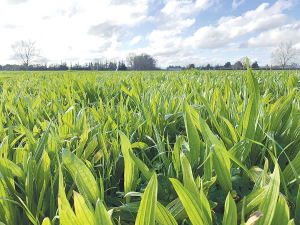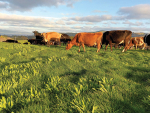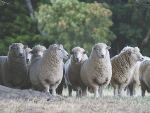Some types of pasture may better reduce nitrogen leaching on New Zealand dairy farms than plantain, a major new science review concludes.
It recommends future research into pasture-based N-mitigation tools focus on other plant species which share plantain's lower dry matter content but grow more feed, especially during the cool season, last longer and are easier to manage.
Authored by a team of leading pasture scientists across both academia and industry, the review has just been published in the NZ Journal of Agricultural Research and examines 15 years of plantain research in NZ.
It finds little evidence that a visual presence of 30% plantain in pastures will beneficially reduce N leaching, and says higher levels of plantain accentuate pasture management problems.
"We propose that the current recommendations around the use of plantain should be re-examined, and that opportunities presented by alternative forage species and pasture management practices should be investigated to provide alternative approaches," the authors say.
They highlight chicory and tetraploid hybrid ryegrass as two key alternative forages that merit further study for N-mitigation.
These could have a similar effect on N leaching and be easier to deploy at scale than plantain, with higher yield, better persistance and higher cow intake.
Review co-author Dr Tony Conner, Lincoln Genetics Ltd, is a plant geneticist and former manager of forage science at AgResearch, with a long career in applied plant science in NZ.
He believes forages other than plantain have not been adequately studied for their potential value as N-mitigation tools on NZ dairy farms.
"Clearly plantain increases animal urination, and we suspect that's because it has a relatively high water content. Obviously if the animal is taking in more liquid, it urinates more.
"But there are other forages with a higher water content than diploid perennial ryegrass that might perform equally as well as plantain, including chicory and tetraploid hybrid ryegrasses, and I don't believ these have been considered enough, given that plantain does not perform well in pastures."
 |
|---|
|
Dr Tony Conner
|
Conner says the new review of all the research done on plantain so far can benefit both scientists and farmers seeking future solutions to one of the most pressing environmental challenges facing the NZ dairy industry.
For scientists, the review highlights opportunities for improved experimental design of field trials such as those used to support claims of plantain's effect on N leaching. The review found many research studies supporting the beneficial impact of plantain do not stand up against scientific scrutiny associated with methodology, and data interpretation.
"Controlled field experiments are inherently very difficult to do. They are affected by many co-related factors and different variables, and some of the results can be ambiguous and difficult to interpret," Dr Conner says.
"I would like scientists to think carefully about their experimental design for these kind of field experiments, with appropriate control treatments in place, as well as considering alternatives to plantain."
For farmers, the review is a chane to take a second look at N-mitigation strategies.
"They're caught in the middle here, because there's been a lot of publicity about plantain, and the data is very hard to dissect. I'm hoping this will raise some questions in farmers' minds," says Conner.
'An examination of the ability of plantain (Plantago lanceolata L) to mitigate nitrogen leaching from pasture systems’ has been authored by Dr Colin Eady, Barenbrug; Dr Conner; Adjunct Professor Jacqueline Rowarth, Lincoln University; Dr Graeme Coles, Victoria University; Dr Matthew Deighton, Cropmark Seeds, and Professor Derrick Moot, Lincoln University.
https://www.tandfonline.com/journals/tnza20




















